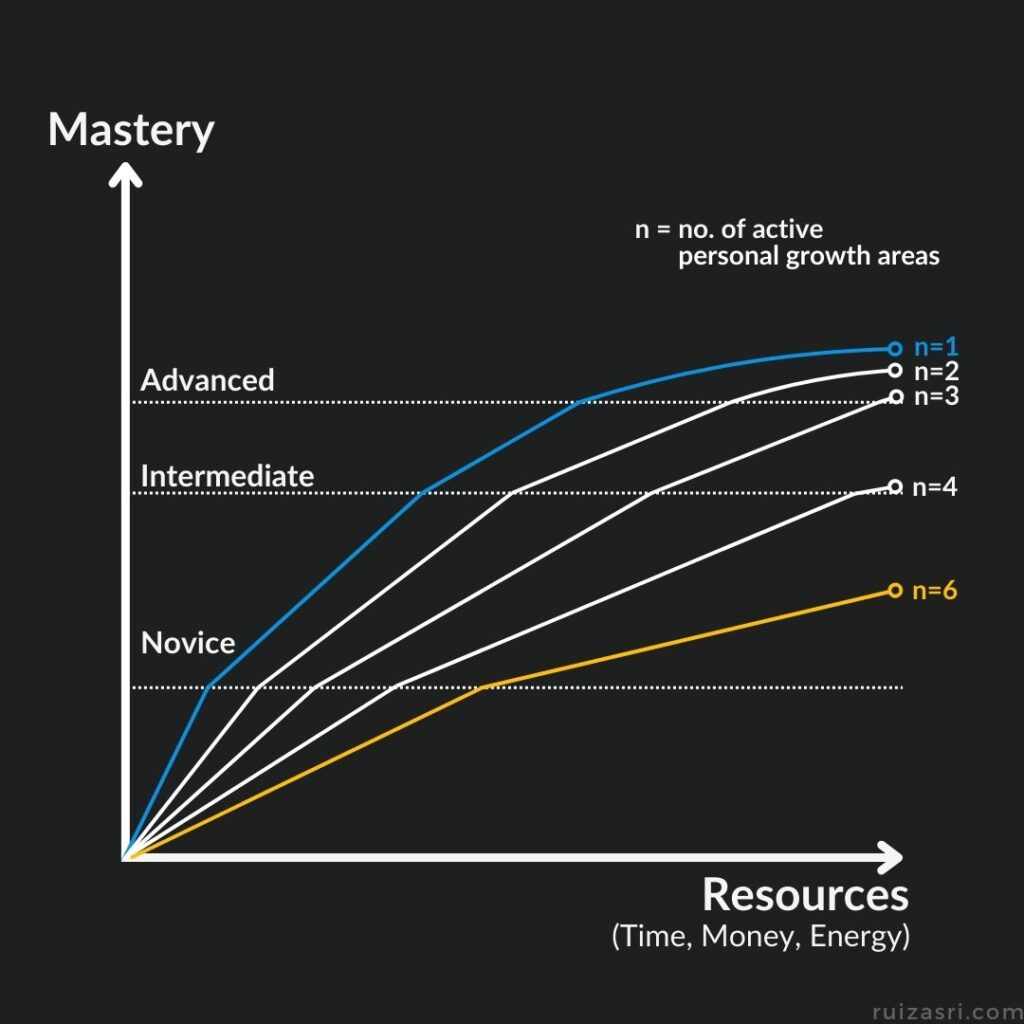If you’re reading this newsletter, you are a lifelong learner.
And the problem with lifelong personal growth is that soon enough you will start hitting your limit.
As you stack more personal growth projects to do, you will begin maxing out your resources. Inevitably you’ll realise that you no longer have any more time, money nor energy to further your development.
The Difficult Choices of Personal Growth
It could be that you’re getting fit and better at bouldering, but starting a side hustle for extra income means sacrificing your climbing time. It could be that you would love to read more books on spirituality, but that may mean spending less meaningful time with family and friends.
In my case:
- I’ve sacrificed many nights and weekends working hard to grow my business, sacrificing time to build closer relationships with family and friends.
- I had to choose, many times, between dedicating more time to improve my physical health and to develop new skills for my career.
- I needed to decide which projects to let go of, so that I can get some time and energy back for the sake of my mental health.
- And so on.
Eventually, your self development journey will arrive at a crossroad where you must make the difficult choices of sacrificing one growth over another. As the saying goes,
“You can’t have everything in life”.
But I am stubborn. And greedy.
The question that keeps floating in my head is : “Why not? Why can I not develop all of my Areas of Growth at the same time?”
There must be a way.
And indeed there is.
But it is not an easy path.
The Best Path: Everything, All, At The Same Time
See, I am quite the greedy fellow when it comes to personal development.
I want to do EVERYTHING. And I want to do it ALL at the same time.
But this desire stems from my belief that that is the best path of personal growth.
I fundamentally believe that it is better for you and I to develop multiple Areas of Growth in parallel. I am a contrarian to the mainstream thought that you should focus and master a single Area of Growth at a time.

In all aspects of life – whether it’s in building a career, socialising with people or taking care of your family – the whole package that is ‘You’ matters.
Great programming skills can be the basis for a fruitful career, but it loses its edge if you find no meaning in the product you build.
Having a healthy and attractive body will get people’s attention, but you won’t make genuine friendships if you don’t know how to connect emotionally with another person.
Making lots of money for your family’s financial security is awesome, but it’s an empty victory if you’re mentally checked out most of the time and cannot meaningfully bond with your loved ones.
At the end of the day, “You are only as strong as your weakest link”.
And this is why I believe that you should not focus on developing just one aspect of your life.
Rather, you and I should cover all our weak links and continually build into becoming a stronger whole*.
*This relates to the Six Harmonies framework that focuses on balance and harmony in personal development.
But the problem above of ‘maxing out resources’ persists.
On the one hand, we understand the importance of developing multiple Areas of Growth at the same time. On the other hand, we recognise that by trying to grow different areas in parallel, we hit our limits and are forced to make sacrificial choices.
The solution? Change our perspectives.
Here’s what I mean.
My Contrarian Perspective to Growth
It is a common thought in society that most young people don’t have the patience to work through something. The passion that fuels them with energy to learn new things is also the reason they are too impatient to persevere. By the time they realise the value of patience, time is no longer on their side.
But I don’t agree with this.
Passion, perseverance and patience have nothing to do with age. Here’s an example.
I’m in my 30s, and I’m just starting to learn how to code.
I am so passionate about coding that I wish I could learn faster so that I can build cool stuff.
I value patience, but still, I often find myself being impatient about how slow my learning progress is.
I still catch myself getting frustrated about my progress, and need to remind myself to persevere.
To me, a person’s ability to be patient and persevere in a new venture to develop themselves is correlated to their expectation of their progress rate. In other words, the larger the expectation to grow fast, the more impatient they will become.
Young or old, you won’t persevere in a self-development activity if you have unrealistic expectations.
So, the root of my impatience above lies with my own unrealistic expectation of myself.
I expected myself to be able to learn at the same rate as I did when I was a student. This is unrealistic, and is the cause of my impatience. When I was still a student, I only had 1 or 2 things I was truly focusing on developing, unlike now.
I simply have forgotten that I am actively developing many different Areas of Growth at the same time. The fact is, my slow rate of progression is only natural when I am trying to grow in all directions.

A person who is carrying a single item can certainly run fast down the path with little risk of falling.
But a person who is carrying multiple items at the same time better walk slowly, to not risk losing balance and dropping everything.

For life-long learners like you and I, we need to recalibrate the expectations we hold on to ourselves.
- Don’t compare yourself to someone who is only focusing on one Area of Growth. It is only natural that he or she grows at a faster rate than you.
- Don’t compare your current self to your past self. The growth rate you experience when you’re juggling many Areas of Growth will not be the same as when you were focused on one single thing.
- But don’t let the slower pace discourage you. Grow slow and steady.
You and I are not in a 100 metre sprint. It’s not about going fast.
We are in an ultra-marathon. It’s about going the distance.
As with any life lessons, they are easier said than done. So here are some tangible actions that you can take to apply the lessons above:
Return to your Odyssey Plan
It’s easy to become impatient in the now when you’ve lost sight of your long-term goals. If you’ve created your own Odyssey Plan, lay out the 10-year plan in front of you and remind yourself of what your future goals were.
This will help you recalibrate your expectations and reinvigorate your spirits to persevere for your North Star.
Focus on the output, not the outcome
When sports coaches want to motivate their team to win, they don’t tell them to “Focus on scoring points” (Outcome). Instead, the coaches strategies and instruct the team on taking key actions like “Keep passing through the right wing” (Output).
To persevere and progress, we need to be more action orientated. Focus on our outputs (key actions), and not the outcomes (results). This is the operating principle of the 12-Week Grind system.
Harmonise your Areas of Growth
Consider the Six Harmonies approach of harmonising the different Areas of Growth. In short, this means doing activities that strengthen two or more areas at the same time.
For example,
- Instead of committing to a running routine to build stamina, invite your spouse or friend to do it with you so that you can also build your relationships.
- Don’t just dedicate time to building a side hustle for extra income, but also incorporate a strict time schedule to create a good work-life balance to better manage your mental health.
***
Remember, you and I are lifelong learners.
This path ain’t easy, but nothing worth having comes easy.
Let’s go the distance.
Ruiz
